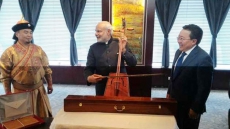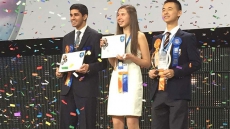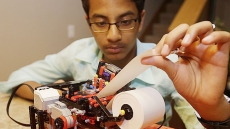India and Mongolia forged a strategic partnership, building on the "bonds of hearts and minds" over the "barriers of distance", as Narendra Modi on Sunday became the first Indian prime minister to visit the landlocked northeast Asian nation which has declared India as its "third neighbour" as well as "spiritual neighbour".
The two countries also inked 13 agreements, including in the sphere of air services, cyber security and transfer of sentenced prisoners.
Modi, speaking at a dinner reception at the end of a packed schedule marked by his striking up a personal rapport with the Mongolian leadership, said that "in less than 24 hours, we have experienced true friendship".
"The importance of a journey is not measured by the distance covered, but by the destination reached. The visit may be short but the outcomes are substantive and significant.
"In the course of one day, we have imparted our ancient relations new strength and momentum," Modi said.
Modi, who held talks with President Tsakhiagiin Elbegdorj and Prime Minister Chimed Saikhanbileg in the State Palace here, announced a $1 billion Line of Credit to Mongolia for its infrastructure projects.
"Mongolia is an integral part of India's Act East Policy. The destinies of India and Mongolia are closely linked with the future of the Asia-Pacific Region."
Modi said both sides have decided to upgrade their Comprehensive Partnership to the level of 'Strategic Partnership'.

"We also agreed to renew our Treaty of Friendly Relations and Cooperation."
He said India and Mongolia can boost cooperation in the civil nuclear field as Mongolia was rich in uranium and mineral resources.
Both countries inked a civilian nuclear deal for uranium supplies in September 2009, but are yet to complete its internal processes for initiating supplies to India.
The joint statement said a joint working group has been asked "to explore opportunities for future collaborative actions in the spirit of mutual benefit".
Mongolia, which is sandwiched between China and Russia but shares frosty relations with both, has evolved the concept of "third neighbour".
Saikhanbileg, in his media statement after the talks at the State Palace in the morning, said Mongolia "firmly regards India as our third neighbour and our spiritual neighbour".
At the dinner reception, he said that "regardless of the geographical distance that separates us, we have been always bound close together".
Modi spoke in a similar vein at the State Palace, saying that "Indians and Mongolians are telling the world that the bonds of hearts and minds have the strength to overcome the barriers of distances".

Modi thanked Mongolia for its "strong support" for India's bid for permanent membership of the United Nations Security Council.
In his address at the Mongolian parliament, or Great Hural, which was opened on Sunday in a special gesture of honour for the visit, Modi said Mongolia terming India as its spiritual neighbour was a high form of honour.
There were "no bonds more sacred than this. We in India are honoured that you think of us this way".
In the field of defence, both sides agreed to continue to work towards further intensifying bilateral defence and security cooperation through exchanges of high and mid-level visits, regular consultations, military personnel exchanges and capacity building among other things.
The MoUs signed included those for setting up a Cyber Security Training Centre in Mongolia's defence ministry; the National Security Councils of both countries are to hold consultations on security issues, counter-terrorism, intelligence cooperation and exchange; enhancing cooperation between their border guarding forces in capacity building, conduct of joint exercises, surveillance and policing.
Modi also handed over Bhabhatron, a telecobalt machine developed by BARC for cancer treatment, at Mongolia's National Cancer Centre here.
He laid the foundation stone of the Atal Bihari Vajpayee Centre for Excellence in Information Technology and Communication and Outsourcing.
In the morning, Modi visited the Gandan Monastery and presented a sapling of the revered Mahabodhi tree to the monastery's head abbot Hamba Lama.
Modi stressed the shared legacy of Buddhism in his speeches.
Modi and the Mongolian prime minister also bonded during the Mini Naadam games.
Modi was presented a morin khuur, a traditional stringed instrument, by President Tsakhiagiin Elbegdorj, while Saikhanbileg presented him with a horse, named Kanthaka, after the favourite horse of Prince Siddhartha, who later became Gautama Buddha.

Modi gifted Elbegdorj a specially commissioned reproduction of a rare 13th century manuscript on the history of Mongols.
The prime minister also took selfies with President Elbegdorj, an event no foreign tour is complete without.
He also addressed a community reception and yoga event at the Buyant Ukhaa Stadium, organised by the Art of Living foundation of spiritual guru Ravi Shankar.
Modi is on a three-nation tour to China, Mongolia and South Korea. He flies to Seoul on Monday.




